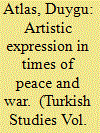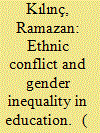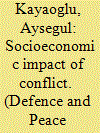|
|
|
Sort Order |
|
|
|
Items / Page
|
|
|
|
|
|
|
| Srl | Item |
| 1 |
ID:
161148


|
|
|
|
|
| Summary/Abstract |
This article traces the effect of the ‘Kurdish opening,’ which led to an artistic surge among Turkey’s Kurdish minority, and the recent renewal of the conflict, which has significantly inhibited that surge. By juxtaposing these two periods, defined in terms of the state’s approach to the Kurds, and looking at the field of Kurdish arts as a space, practice, and discourse, it presents a more holistic picture of Kurdish responses to political turbulence in Turkey, where Kurdish cultural identity and its expression have always been an integral part of the Kurdish political struggle.
|
|
|
|
|
|
|
|
|
|
|
|
|
|
|
|
| 2 |
ID:
144446


|
|
|
|
|
| Summary/Abstract |
This study analyzes the effects of political violence on electoral behavior by focusing on one of the longest lasting ethnic conflicts in contemporary times, the Kurdish insurgency in Turkey. How do armed conflict and electoral institutions shape turnout in a civil war context? Building on an original data-set at the sub-national level, the study reaches two major conclusions. First, it shows rural displacement caused by political violence led to lower levels of turnout and severely hampered access to voting controlling for a wide range of socioeconomic and electoral system variables. Second, an unusually high electoral threshold aggravated this pattern of disenfranchisement and limited the avenues of nonviolent Kurdish political activism with negative implications for the resolution of the conflict.
|
|
|
|
|
|
|
|
|
|
|
|
|
|
|
|
| 3 |
ID:
113529


|
|
|
|
|
| Publication |
2012.
|
| Summary/Abstract |
Theories of environmental degradation as a predictor of armed conflict have gained momentum as scientists warn of the catastrophic consequences of global warming. Despite an increasing number of studies that emphasize this causal relationship, the literature is scant on the reverse linkage - environmental consequences of civil war. This study seeks to examine the impact of civil war on the environment and argues that state forces deliberately transform the environment to undermine rebels' ability to wage a war. Using data from the Kurdish conflict in Turkey, this study presents evidence for the devastating effects of civil war on deforestation and the agrarian economy.
|
|
|
|
|
|
|
|
|
|
|
|
|
|
|
|
| 4 |
ID:
159336


|
|
|
|
|
| Summary/Abstract |
Although conflict remains a major obstacle to development in many areas of the world, its impact on education has been rarely studied. This article investigates the relationship between conflict and gender equality, focusing on the schooling of the girls in the conflict-ridden regions of Turkey. Patriarchy is the most important determinant of low educational levels among girls in Southeastern Turkey. However, ethnic conflict exacerbates male-dominant traditions and blocks economic development, reinforcing patriarchal norms and limiting girls’ school attendance. Yet, by provoking political mobilization around a Kurdish identity, ethnic conflict may undermine patriarchy and unintentionally promote girls’ education.
|
|
|
|
|
|
|
|
|
|
|
|
|
|
|
|
| 5 |
ID:
180198


|
|
|
|
|
| Summary/Abstract |
The unit of analysis in almost all large-N studies on conflict contagion and diffusion is collective actors, such as states and ethnic groups or movements. Thus, contagion dynamics and processes at the individual level have been neglected. Using original data derived from a public opinion survey, this study examines the micro-level dynamics of contagion in the context of Turkey’s Kurdish conflict. The study suggests that transnational ethnic ties, and in particular, cross-border familial bonds and interactions, facilitate conflict contagion through several strategic and ideational mechanisms. First, transborder familial ties and interactions amplify the demonstration effect of ethnic-kin achievements in contiguous conflict countries. Second, cross-border familial bonds facilitate collaboration between cross-border co-ethnics. Finally, such ties to conflict zones with ethnic kin groups empower pan-ethnic identities. The empirical findings show that Kurds living in Turkey who have close relatives in nearby countries hosting conflicting ethnic-kin groups (i.e. Syria, Iraq, and Iran) have stronger ethnonationalist orientations and claims against the center. However, having close relatives elsewhere (e.g. Europe) does not generate the same impact. The Kurdish case evidences that contagion processes and dynamics might vary substantially across the members of a particular ethnic group. Hence, it is necessary to broaden the conventional focus on collective actors in conflict contagion research and pay greater attention to micro-level variables and factors.
|
|
|
|
|
|
|
|
|
|
|
|
|
|
|
|
| 6 |
ID:
080707


|
|
|
|
|
| Publication |
2008.
|
| Summary/Abstract |
Until the end of the twentieth century, Turkey's East-West paradigm found refuge in the ambiguous construct of Eurasia and was entrenched in an authoritative centralised state. With EU candidature and the radical reforms ushered in by the Islamist-based government, the Turkish Republic finds itself at its most critical juncture since its formation in 1923. In reviewinccg Turkey's reform process, the paper exposes the rifts in its dual Western-Anatolian personality, the ineptness of its Eurasia synthesis, the fragility of its special relationship with the United States and the inherent contradictions embedded in Kemalist statism. The paper argues that by seeking to join the EU, Turkey has also-inadvertently-embarked on a collision course with the Kemalist Devlet (state). The paper surveys the (European) fault line that currently divides Turkey, accentuating deep-seated dualisms-some dating to Ottoman times-that have been concealed by the Kemalist state. Finally, the paper argues that success (or failure) of the Euro-Turkish 'project' hinges on Turkey's capacity to reconcile itself with its suppressed historical past and radically reform the inherent contradictions of Kemalism-at the core of which is the military's inherent role as custodians of the Kemalist state.
|
|
|
|
|
|
|
|
|
|
|
|
|
|
|
|
| 7 |
ID:
161145


|
|
|
|
|
| Summary/Abstract |
Analyzing the Kurdish conflict, we examined how Kurds and Turks in Turkey and in the diaspora (in Belgium) construe reconciliation and how they approach reconciliation and intergroup forgiveness. Kurds’ construal of reconciliation tapped into seven themes, grouped as a dialogue-based construal of reconciliation (themes: dialogue, recognition, emotions and peace) versus a rights-based construal (themes: identity rights, freedom and confederative rights). Turks’ construal of reconciliation covered eight themes, grouped as unity-based construal of reconciliation (themes: unity, rights, dialogue, recognition, and emotions), disarming PKK-based construal of reconciliation (themes: disarming PKK and peace) and rejecting reconciliation (theme: rejection of reconciliation). Kurds endorsing the emotion and dialogue themes and Turks endorsing a unity-based construal of reconciliation were more forgiving of the other group. Implications of these different meanings and relationships of reconciliation are discussed.
|
|
|
|
|
|
|
|
|
|
|
|
|
|
|
|
| 8 |
ID:
143603


|
|
|
|
|
| Summary/Abstract |
Uprising tensions during 2010 in eastern and southeastern regions of Turkey provoked arguments about the necessity for a State of Emergency (SOE; ‘Olağanüstü Hal’ in Turkish) declaration in those regions, with a belief of enduring political sustainability. The discussion is inflamed by a speech of the Nationalist Movement Party’s leader about the suggestion to announce a SOE ruling after the death of 24 Turkish soldiers in Hakkari (a city in the southeast of Turkey) in an attack of the PKK (Kurdistan Workers’ Party) on the 19 October 2011. Although a new announcement of SOE did not take place, the discussion itself induced the idea behind this paper which is to provide a quantitative analysis of the SOE in Turkey. In fact, the SOE ruling is not a new concept for Turkey and it has been implemented in 13 cities in the eastern and southeastern regions from 1987 to 2002. Although there have been many discussions about the costs of these 15 years of the SOE ruling in terms of military expenditure and, thus, on the national budget, there is a lack of quantitative analytical examination of the economic and social costs of it. Difference-in-differences analysis reveals negative spillover impacts of the SOE, especially on the forced migration, unemployment, and educational investments. The results also show that SOE ruling is an important factor for the underdevelopment of the eastern and southeastern regions in Turkey and, thus, a new SOE will bring enormous inequalities, both economically and socially, and an intensification of the ethnic tensions in Turkey.
|
|
|
|
|
|
|
|
|
|
|
|
|
|
|
|
| 9 |
ID:
169280


|
|
|
|
|
| Summary/Abstract |
Previous literature explains peace negotiations mainly with country-level factors or events related to the countries where the peace efforts take place. This closed polity approach contrasts with contemporary peace processes where the actors and demands transcend nation-state boundaries. This paper challenges this dominant understanding in the peace process literature and focuses on the role of the rebel groups’ transborder kin connections in affecting peace process dynamics. By studying the Kurdish Peace Process conducted between the Government of Turkey and the PKK, the paper argues that the transborder kin connections can both remedy and exacerbate bargaining problems acute to peace processes.
|
|
|
|
|
|
|
|
|
|
|
|
|
|
|
|
|
|
|
|
|